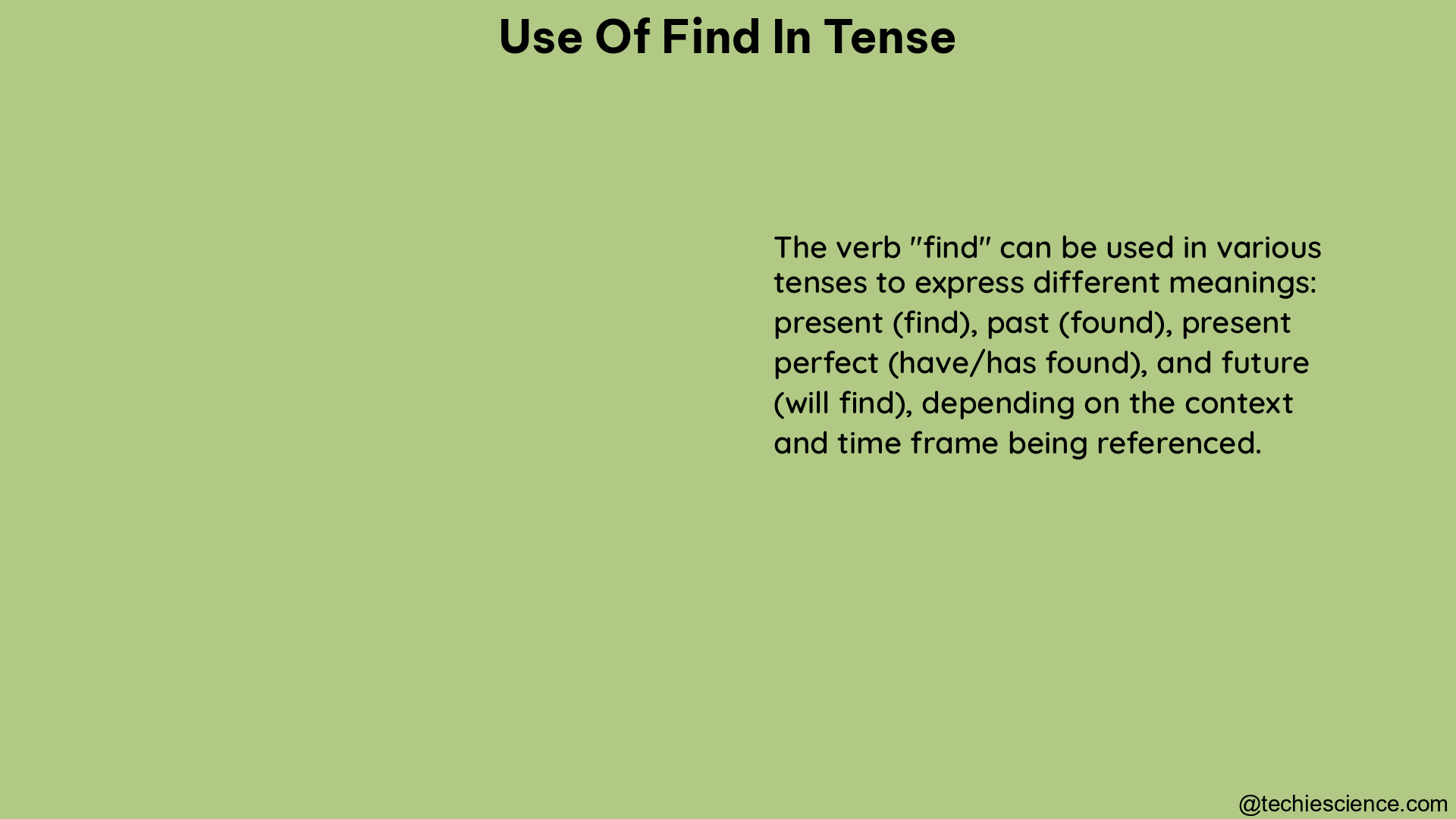The verb “find” is an irregular verb in the English language, and its conjugation across different tenses follows specific patterns. This comprehensive guide will provide you with a deep understanding of how to use the verb “find” correctly in various tenses, including common mistakes to avoid and detailed examples to reinforce your learning.
Present Tense
In the present tense, the conjugation of the verb “find” follows this pattern:
| Person | Singular | Plural |
|---|---|---|
| First | I find | We find |
| Second | You find | You find |
| Third | He/She/It finds | They find |
Examples:
– I find a new book to read every week.
– You find the best deals at the local market.
– She finds joy in gardening.
– We find it challenging to make a decision.
– They find the new restaurant quite impressive.
Past Tense

The past tense of the verb “find” is formed using the irregular past tense form “found”:
| Person | Singular | Plural |
|---|---|---|
| First | I found | We found |
| Second | You found | You found |
| Third | He/She/It found | They found |
Examples:
– I found my lost keys under the couch.
– You found the missing dog in the park.
– She found a new job that she loves.
– We found the hidden treasure in the old attic.
– They found a great new restaurant for dinner.
Past Participle
The past participle form of the verb “find” is also “found”:
Examples:
– The lost wallet has been found by the receptionist.
– The missing documents were finally found in the filing cabinet.
– All the necessary information has been found to complete the project.
Future Tense
To form the future tense of the verb “find,” we use the base form “find” along with the modal verb “will”:
| Person | Singular | Plural |
|---|---|---|
| First | I will find | We will find |
| Second | You will find | You will find |
| Third | He/She/It will find | They will find |
Examples:
– I will find a new apartment to rent next month.
– You will find the answer to the problem in the textbook.
– She will find a solution to the technical issue.
– We will find a way to resolve the conflict.
– They will find a suitable candidate for the open position.
Perfect Tenses
The perfect tenses of the verb “find” are formed using the past participle “found” in combination with the appropriate auxiliary verbs:
- Present Perfect:
- I/You/We/They have found
-
He/She/It has found
-
Past Perfect:
- I/You/We/They had found
-
He/She/It had found
-
Future Perfect:
- I/You/We/They will have found
- He/She/It will have found
Examples:
– I have found the book you were looking for.
– By the time the concert started, we had already found our seats.
– By this time next year, they will have found a new solution to the problem.
Common Mistakes to Avoid
- Confusing Forms: Incorrectly using the past simple form “found” when the past participle form is required, and vice versa.
- Incorrect: “The keys have found.” (should be “The keys have been found.”)
-
Correct: “The keys have been found.”
-
Incorrectly Using the Base Form: Using the base form “find” when referring to actions in the past.
- Incorrect: “I find the book yesterday.” (should be “I found the book yesterday.”)
-
Correct: “I found the book yesterday.”
-
Misusing Patterns: Applying regular verb endings (-ed) to “find” instead of using the correct irregular forms.
- Incorrect: “I finded the book.” (should be “I found the book.”)
- Correct: “I found the book.”
By understanding the proper conjugation and usage of the verb “find” in different tenses, you can effectively communicate your ideas and avoid common grammatical errors. Remember to practice using the verb “find” in various contexts to solidify your understanding and improve your English proficiency.
References
- WordReference.com – Conjugation of find
- ThoughtCo – Example Sentences Using the Verb “Find”
- Preply – What is the past tense of find?
Hi… I am Sowndharya Jagadeeswaran, a university rank holder in M.A. English Literature. I have also done my master’s in Business Administration. Inquisitive as I am, my interest in action-oriented research helped me publish research papers in reputed journals. Now, as a career, I am an instructor where I teach young and adorable students the intricate technicalities of Public Speaking and Creative Writing. I also enjoy writing articles on topics I specialize and research in.
You can connect with me through LinkedIn.-